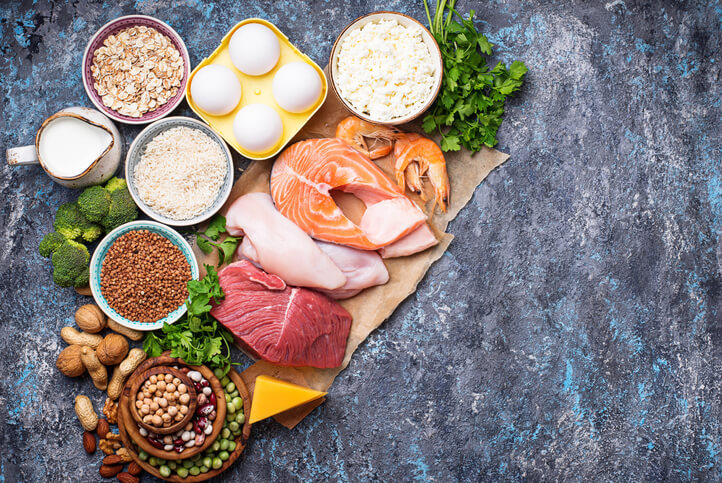Lack of Adequate Protein in a Man's Diet May Affect Baby’s Heart Health

We often talk about how people look “just like their mother” or “just like their father.” And it’s true that we may inherit some of our parents’ physical characteristics. But genetics is really a fascinating science and involves so much more than just how we look.
For example, I learned through whole genome sequencing what diseases and conditions I am at risk for.
And there is significant credible evidence to suggest that before we are even conceived, the health of both our parents may have a major impact on our long-term health. But we always seem to emphasize the important role the woman plays in ensuring the health of the newborn child. She is, after all, the one carrying the baby, right?
However, as I have previously blogged about, the health of the expectant father is just as important. A father’s health status and lifestyle choices before and at the time of conception, can have an impact on conception, on the course of the pregnancy and on his child’s long-term health.

Not surprisinglly, diet definitely plays a major role. For example, it is important that a man eats healthily and gets an adequate intake of essential nutrients, because this helps promote healthy sperm. And research shows that genetic material is passed through sperm. So basically, you want a healthy messenger (sperm).
Now, protein is a nutrient I’ve been talking a lot about lately. I don’t play favorites with my nutrients (water, carbohydrates, fats, vitamins, minerals and protein are all equally important to our health and wellbeing), but protein is a really incredible nutrient.
Getting an adequate intake of protein may help with muscle repair and recovery after working out, and it may help delay sarcopenia (age-related muscle loss). It also helps us feel full and satiated which may prevent hunger pangs and help us maintain a healthy weight.
And now, a recent study involving mice suggests that if a father does not get enough protein in his diet it could affect the quality of his sperm and long-term cardiovascular health of his offspring.
(This is a pretty big deal when you think about the fact that heart disease is the leading killer of Amercian men and women).
Here is how the researchers carried out their study. According to one report discussing the study, mice were fed either a controlled normal protein diet (18 percent protein) or a low protein diet (nine percent protein) for a minimum of seven weeks before conception.
“The results showed that the poor quality [low protein] diet may have altered the genetic information carried in the sperm which changed the way blood vessels formed in the developing fetus, and so affected the cardiovascular function in the offspring.”
Furthermore, “The study also showed that the fluid the sperm are carried in, the seminal plasma, also influenced offspring cardiovascular health.”
According to one of the lead researchers, if the blood vessels in the developing fetus do not form properly this could lead to permanent changes in how the blood vessels work, “resulting in programmed cardiovascular ill-health in his offspring.”
On top of this, a previous study suggested that male mice given a low protein diet “produced sperm with fewer chemical tags on their DNA that regulate gene expression than mice fed a normal diet. Researchers also observed that the seminal plasma suppressed maternal uterine inflammatory and immunological responses, essential for a healthy pregnancy.”
So when it comes to having a child, it may take two to tango but it also takes two to help secure the life-long health of the child. If you and your partner want to have a child, it is important that you both assess your current health status. If it is determined (per a competent healthcare professional) that either one of you could take some proactive steps to improve your health, might I suggest taking these steps before attempting to conceive?
Eat healthily, exercise amd avoid smoking like the plague. It is also recommended that men who want to become fathers quit drinking alcohol at least six months before conception (for women, it is one year).
So how much protein?
“The recommended intake for a healthy adult is 46 grams of protein a day for women and 56 grams for men. And while protein malnutrition is a problem for millions of people around the globe, for the average adult in developed countries, we are eating far more protein than we actually need,” according to this report.
Many Americans eat up to 100 grams of protein a day. So don’t go overboard with the protein if you are trying to become a dad. Chances are you are getting enough, unless you have a very restrictive diet.
You also want to take a look at the quality of protein you are eating. For example, are you getting protein from bacon and processed meats that may increase your risk of developing certaining diseases such as cancer, or are you getting your protein from healthy sources such as lentils, broccoli, eggs, salmon, beans or whole grains?
So get healthy and get to making that baby. And men, if you need some tips on how to be your most fertile and how good nutrition may help you, read here.
Men should also consider having their nutrient levels tested to make sure their bodies are getting enough nutrients, and in the right amounts, to promote sperm health and fertility. Testing provides the opportunity to work with a competent healthcare provider to address imbalances. If an imbalance is discovered, a competent healthcare professional can work with you on making the necessary dietary changes and recommend quality supplements if necessary.
Enjoy your healthy life!
The pH professional health care team includes recognized experts from a variety of health care and related disciplines, including physicians, attorneys, nutritionists, nurses and certified fitness instructors. This team also includes the members of the pH Medical Advisory Board, which constantly monitors all pH programs, products and services. To learn more about the pH Medical Advisory Board, click here.







